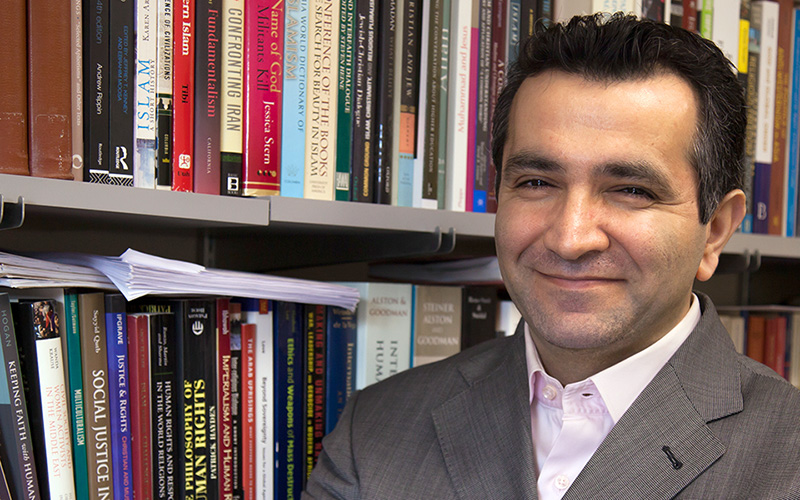
Upholding Democracy
Turan Kayaoğlu believes that democracy, rule of law and human rights will eventually prevail in all societies. His research into the Middle East gives him that hope.
UW Tacoma Professor Turan Kayaoğlu left the Middle East more than 20 years ago, but in many ways the Middle East never left him. Born in the small Turkish village of Perçem, Kayaoğlu moved with his family to the bustling metropolis of İstanbul at age four. The city provided job opportunities and access to education.
Neither of Kayaoğlu’s parents received formal schooling. Kayaoğlu went to class in cramped rooms with upwards of 60 other students. Even so, he thrived. In middle school he opted to attend a technical school and pursue a career as a computer technician. At that time most Turkish students chose between attending a technical school or a university. Kayaoğlu decided he’d do both. He took the national university exam and placed in the top 100. More than a million Turkish students took the exam that year.
Kayaoğlu earned a bachelor’s degree in international relations at Bilkent University, Ankara. Upon graduation he opted to move to the United States. “I wanted to be an academic, and I had a professor who used to always say that the United States was the maker of knowledge,” said Kayaoğlu.
The Turkish government provided Kayaoğlu with a scholarship to study at the University of Denver. He earned a master’s in international studies and went on to receive a political science Ph.D. from the University of Washington.
In addition to teaching at UW Tacoma and providing leadership to faculty in his role as Vice Chair of the UW Tacoma Faculty Assembly (he will become Chair during the 2021-22 academic year), Kayaoğlu was recently elected to serve on the Puyallup School Board. His believes that access to education opened many doors for him, so he is driven to continue to make contributions that will enrich the lives of the students he impacts.
***
Kayaoğlu has written three books and published more than a dozen scholarly articles. Most of his research focuses on Islam and the Middle East. Kayaoğlu’s new book project— “Rethinking Islam and Human Rights: Voices from the Grassroots” — looks at how Islamic human-rights non-governmental organizations (NGOs) protect and promote human rights. In 2019, he served as a visiting scholar to the Brookings Institute Doha Center in Qatar where he continued his research and analysis of human rights in the region.
Kayaoğlu’s interest comes from a love of place. “I came from that geography, it is intimately tied to me,” he said. This relationship is also informed by Kayaoğlu’s time in the United States. “I got my education in mostly liberal Western institutions and I ended up embracing the values of democracy and of human rights,” he said.
This tension lives at the center of Kayaoğlu’s academic career. “My struggle has been to try to understand why we (the Middle East) don’t have democracy, why we don’t have economic development and why we don’t have respect for human rights,” he said.
Kayaoğlu is a student of history. He knows the contributions made by both Islam and the Middle East have transformed society in positive ways. “When I look at Islamic history, I’m inspired by contributions of generation of people in this geography to the development of agriculture, sciences, mathematics, and arts,” he said.
***
In some ways, Kayaoğlu’s research is a detective story, one where the main character tries to piece together what happened, not to a person, but a region. Kayaoğlu’s work has led him to some conclusions.
The present situation, in Kayaoğlu’s thinking, can be traced back to internal and external forces. For the latter, Kayaoğlu points to Western involvement in the Middle East whether that’s the United States’ relationship with the Saudi Arabian government or U.S. led wars in countries like Afghanistan and Iraq. “You cannot impose democracy and the rule of law with a weapon,” he said. “You cannot say ‘I order you to democratize.’”
Internally, Kayaoğlu sees a lack of separation of church and state as an issue. “Governments and religious establishment often work together to quash democratic voices and human rights advocates,” he said. “This makes religion much more conservative and exclusionary and it makes governments much more authoritarian,” he said.
***
Kayaoğlu is from Turkey but he doesn’t get to return home often. The nature of his research makes it difficult to return to a country that has been tilting towards authoritarianism in recent years. “If I’m being critical of human rights in a place, how can I go there go there knowing that I may be subjected to coercion or pressure,” he said. “I look at the situation in some places and my heart breaks.”
Still Kayaoğlu is hopeful. He sees some encouraging signs in places like Morocco and Tunisia. “I believe that eventually all societies will evolve in some way where they will uphold democracy, rule of law and human rights. I really believe that.”



